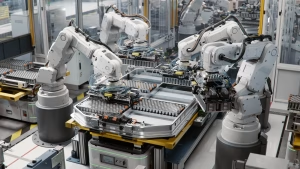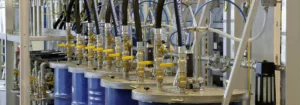Updated: August 25, 2025
Air motors—also known as pneumatic motors—have been converting compressed air energy into mechanical work for more than two centuries. Today, Atlas Copco air motors represent the pinnacle of this technology: safe, flexible, compact, and powerful. Built for demanding industries, they combine reliability, efficiency, and adaptability in ways that electric motors cannot always match.
What is an Air Motor?
An air motor uses compressed air as its energy source, transforming pneumatic energy into rotary or linear motion. This principle is straightforward yet highly effective: compressed air is distributed through cost-efficient pipework—already standard in most manufacturing environments—and drives the motor without the risks of sparks or overheating.
Unlike electric drives, Atlas Copco pneumatic motors can be stalled indefinitely without damage, operate in any position, and maintain consistent performance under challenging conditions.
Advantages of Atlas Copco Air Motors
Atlas Copco has refined air motor technology to deliver measurable industrial advantages:
Compact and Lightweight: Up to 85% smaller and 75% lighter than equivalent electric motors.
High Power-to-Weight Ratio: Up to 2–3 times higher than electric drives, enabling powerful performance in tight spaces.
Safe for Hazardous Environments: No sparks, minimal heat generation, and ATEX-certified models reduce explosion risk.
Non-Stop Operation: Air expansion cools the motor during operation—eliminating overheating concerns.
Flexible Mounting: Can operate in any position, making them ideal for customized assemblies.
Low Maintenance & Ownership Cost: With fewer heat-sensitive components and simplified installation, Atlas Copco motors cut downtime and costs.
Atlas Copco Product Range
Atlas Copco offers one of the most comprehensive portfolios of pneumatic motors, engineered for performance, durability, and compliance across industries:
Vane Air Motors (LZB, LZL Series)
Power: 0.1 – 6.5 kW | Speed: up to 10,000 rpm | Torque: up to 502 Nm
Available in lubrication-free, stainless steel, and ATEX-certified versions.Piston Air Motors (PZB Series)
Low speed, high torque—perfect for precise control applications.Turbine Air Motors (TZB Series)
Deliver extremely high torque (up to 440 Nm) with smooth, stable performance.
Technical Data: Performance Correction at Different Pressures
Atlas Copco rates its motors at 6.3 bar (91 psi). When operating at other pressures, performance adjusts as follows:
| Supply Pressure (bar / psi) | Power Factor | Torque Factor | Air Consumption Factor |
|---|---|---|---|
| 7 bar (101 psi) | 1.13 | 1.01 | 1.11 |
| 6 bar (87 psi) | 0.94 | 0.99 | 0.96 |
| 5 bar (73 psi) | 0.71 | 0.93 | 0.79 |
| 4 bar (58 psi) | 0.51 | 0.85 | 0.63 |
| 3 bar (44 psi) | 0.33 | 0.73 | 0.48 |
Source: Atlas Copco Air Motor Pocket Guide
This correction ensures engineers can size motors precisely for application needs.
Typical Applications
Atlas Copco air motors power a wide range of industries, including:
Automotive assembly lines (flexible, lightweight drives for tools and conveyors)
Food and beverage production (stainless steel and lubrication-free motors for hygienic environments)
Chemical and pharmaceutical industries (ATEX-certified motors in explosion-risk areas)
Packaging and material handling (high torque at compact size for conveyors, mixers, and feeders)
Comparison: Air Motors vs Electric Motors
| Feature | Atlas Copco Air Motors | Electric Motors |
|---|---|---|
| Power-to-weight ratio | 2–3× higher | Standard |
| Safety in explosive areas | Spark-free, ATEX-certified | Requires additional protection |
| Cooling | Self-cooled by air expansion | Risk of overheating |
| Stalling | Can stall indefinitely | Risk of overheating/damage |
| Maintenance | Minimal | Higher due to electrical parts |
| Flexibility | Operates in any position | Typically fixed installation |
Frequently Asked Questions
Q1: What is the power range of Atlas Copco air motors?
Atlas Copco offers motors from 0.1 kW to 6.5 kW, covering a wide spectrum of torque and speed requirements.
Q2: Are Atlas Copco motors suitable for hazardous environments?
Yes, Atlas Copco provides ATEX-certified models designed specifically for explosive or flammable atmospheres.
Q3: Can Atlas Copco air motors run without lubrication?
Yes, Atlas Copco offers lubrication-free motors, ideal for clean industries such as food, beverage, and pharmaceuticals.
Q4: How do Atlas Copco air motors handle continuous operation?
They are self-cooling and can operate continuously without overheating, unlike electric motors.
Q5: How do I select the right Atlas Copco motor?
Selection depends on torque, speed, air supply pressure, and application requirements. Atlas Copco provides an Air Motor Selection Guide to support engineers in choosing the correct model.
Conclusion
Atlas Copco air motors combine heritage engineering expertise with modern industrial performance. With their compact design, high efficiency, and robust safety features, they outperform conventional alternatives in critical applications worldwide. Whether your requirement is lightweight flexibility, high torque delivery, or compliance with strict ATEX and hygiene standards, Atlas Copco offers a tailored motor solution to optimize productivity and lower total cost of ownership.
Explore the different types of air motors and choose the right product for your needs, or contact us for more information.


